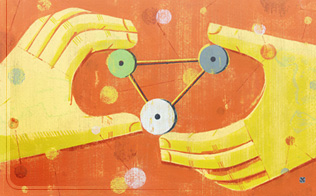The Wilson Center’s Synthetic Biology Project today has developed a first-of-its-kind inventory to track products and applications using the emerging technology of synthetic biology.
In a new op-ed, Eleonore Pauwels of the Synthetic Biology Projects and Jim Dratwa explore the limits of what DNA can tell us.
The Synthetic Biology Leadership Excellence Accelerator Program (SynBio LEAP) has awarded 23 fellowships to a wide variety of professionals to explore the future of synthetic biology. The fellows will convene their first meeting in early February, hosted by the Synthetic Biology Project at the Wilson Center.
David Shifrin of the Public Library of Science (PLOS) speaks with David Rejeski about the importance of properly communicating synthetic biology concepts.
A cross-disciplinary team is calling for public discussion about a potential new way to solve longstanding global ecological problems by using an emerging technology called “gene drives.”
Environmental scientists and synthetic biologists have for the first time developed a set of key research areas to study the potential ecological impacts of synthetic biology.
In a new set of focus groups convened by the Synthetic Biology Project, participants raised concerns about the specific applications of the emerging technology.
The European Research Area Network for the development and coordination of synthetic biology in Europe has released a new report outlining the challenges and opportunities for the technology over the next decade. The document is expected to inform funding and policy decisions.
In the new issue of BioCoder, Dr. Todd Kuiken of the Synthetic Biology Project looks at the increased attention being paid to DIYbio in the halls of power in Washington, DC.
In a new paper published in Science, researchers at Johns Hopkins University announce their creation of the first-ever synthetic chromosome, which many see as a landmark step in the field of synthetic biology.
The Synthetic Biology Project is working with the OpenPlant Synthetic Biology Research Centre in a new effort to encourage the responsible development of synthetic biology in the United Kingdom.
A first-ever survey of Do-It-Yourself Biology (DIYbio) practitioners by the Synthetic Biology Project finds the community to be far different from fearful and often sensationalist representations in the media.
The Synthetic Biology Project at the Woodrow Wilson International Center for Scholars has been awarded a grant to participate in SYNENERGENE, a newly launched consortium of 28 groups supported with €4 million ($5.3 million) to engage in the responsible governance of synthetic biology.
